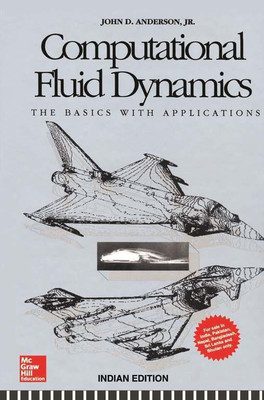Computational Fluid Dynamics The Basics with Applications(English, Paperback, Anderson Jr., John D.)
Quick Overview
Product Price Comparison
A beginner's guide on Computational Fluid Dynamics, Computational Fluid Dynamics: The Basics With Applications is designed to provide an accessible introduction to essential design concepts of this interdisciplinary subject. The textbook can be useful for teaching CFD in aeronautical, chemical, mechanical or civil engineering courses. Summary Of The Book A branch of fluid mechanics, CFD (Computational Fluid Dynamics) uses algorithms and numerical methods to examine and solve problems pertaining to fluid flows. Computation comes into the picture for calculations needed to simulate the gases and liquid interactions in surfaces that are defined by the boundary conditions. As researchers are into developing better software to heighten the speed and precision of such calculations even in complex scenarios like turbulent or transonic flows, John D. Anderson, a qualified aerospace engineer himself, brings about this textbook in order to prepare young aspirants for the field. While most of the texts in this stream are targeted at a graduate level audience, Anderson has written this book with the sole intention of introducing this mathematically sophisticated branch to undergraduate students. He aims to create a sound foundation of the necessary principles. This also helps instructors in simplifying the basics and motivating students to pursue further reading on the subject. Divided into 4 parts with 12 chapters, Computational Fluid Dynamics: The Basics With Applications covers all that is needed for students to efficiently move on to advanced concepts. Part one introduces readers to the fundamental philosophy of CFD. It also includes a comprehensive discussion on the governing physical equations. Part two is reserved for the basics of numerical discretization and this section also contains problems for students to solve. Part three elaborates on some vital and practical applications of CFD. The last part, categorized as Other Topics, deals with a few complex concepts and discusses the future of CFD. There also is a useful appendix involving the application of Thomas' Algorithm. The book also illustrates and details various computer graphics used in CFD. As students require a considerable period of time for learning and assimilating the subject before doing successful calculations on their own, the author has included only a few problems to be worked out. About John D. Anderson John D. Anderson is an American engineer and scholar. Modern Comprehensible Flow, Introduction To Flight, and Fundamentals Of Aerodynamics are a few other books by him. Born in 1937 in Pennsylvania, Anderson is an aeronautical engineering graduate from the University of Florida. He also holds a PhD in aeronautical and astronautical engineering from Ohio State University, which he completed with a NASA fellowship. He has served the United States of America as an Air Force task scientist and as the Head of Hypersonic Group in their Naval Ordnance Lab. He joined the University of Maryland's Department of Aerospace Engineering in the year 1973 as the Chairman. He was a professor at the same university from 1980 to 1999. A fellow of reputed science academies all over the world, Anderson is the recipient of the Lee Atwood Award conferred for his excellence in the field of Aerospace Engineering Education.


